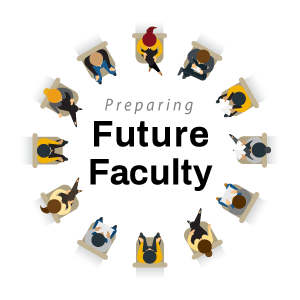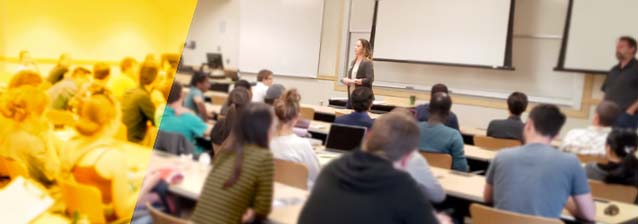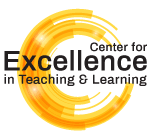| |
CETL | Canvas | AI Guide | Course Design | Online | Software | Workshops
Preparing Future Faculty
 In collaboration with the College of Graduate Studies, the Center for Excellence in Teaching and Learning provides dedicated instructional and pre-faculty development support for all Ph.D. students, TAs, and Post-Docs. In collaboration with the College of Graduate Studies, the Center for Excellence in Teaching and Learning provides dedicated instructional and pre-faculty development support for all Ph.D. students, TAs, and Post-Docs.
The purpose of the Preparing Future Faculty (PFF) program is to provide a differentiating experience and competitive advantage for our graduate student and post-doctoral scholars entering the market, and to positively affect the teaching and learning experience of all instructional faculty and students at the University of Idaho.
Through our affiliation with the prestigious Center for the Integration of Research, Teaching and Learning (CIRTL), we further emphasize the professional development of future faculty with a focus on inclusive and evidence-based teaching and the scholarship of teaching and learning.
As a CIRTL institution, our grad students and post-docs have an opportunity to engage in cross-network programming, events, and --equally importantly-- to leverage affiliation to their advantage. One way to do this is by participating in PFF programming that results in UI-CIRTL Certificates in Higher Education Pedagogy, Learning-through-Diversity (LTD), and Teaching-as-Research (TAR).
A distinguishing characteristic of the University of Idaho’s PFF program is that it is led by CIRTL scholars who are not only experts in the field, but who have designed and lead programs for the CIRTL Network. Graduate students and post-docs at the U of I can earn Associate-, Practitioner-, and Scholar-Level CIRTL credentials in a scaffolded manner during their time at the University of Idaho.
Thursday, September 14, 2023 from 3:30pm until 5:30pm (Pacific Daylight Time)
UI CIRTL Levels, Opportunities, and Credentials
Associate Level
Understanding and implementing evidence-based pedagogy
- Participation in online Higer Education Pedagogy seminar and certificate program.
- Focus: the foundations of evidence-based and inclusive teaching and learning.
- 1:1 Teaching and Learning mentorship
- UI-CIRTL Certificate issued to all participants
- For participants interested in TAR and LTD, a CIRTL Associate-Level Certificate in each is also available.
Practitioner Level
Engage in Scholarly Teaching/Teaching-as-Research
- Participation in TAR Certificate program, develop a TAR project, participate in CIRTL TAR Summer Program.
- Focus: scholarly/reflective teaching, curiosity, and causality; a systemic approach to studying an aspect of teaching and its expected impact on learning.
- Grad students/post-docs create a TAR proposal, implement a TAR Project, and submit an experiential reflection.
- Participants can participate in CIRTL Cross-Network Programming, earn a CIRLT TAR Practitioner Certificate, and be eligible for funding and support to present their work at CIRTL events.
Scholar Level
Share Your Research
- Graduate students/post-docs transform their projects into a presentable or potentially publishable manuscript
- Manuscript submitted for presentation or publication
- CIRTL Scholar Certificate earned and eligibility for professional development (travel) funding.

Not every student or post-doc is expected to advance through all levels; the important thing to know is that the opportunity and support system to do so exists. Ideally, all grad students and post docs will engage in Associate Level programming, earning Certificates in Higher Education Pedagogy, Learning-through-Diversity, and Teaching-as-Research along the way. These programs focus on the basics.
A subset of those may seek an Advanced Certificate in Higher Education Pedagogy and/or engage in a Teaching-as-Research project, both of which include a deeper dive and recognition for Practitioner Level CIRTL credentialing. Here students may complete a handful of teaching and learning workshops that foster and require evidence of the development of a set of instructional skills or design a TAR project --something they will do in a class to gauge the impact of a teaching practice on student learning or engagement.
An even smaller subset may feel like they are on to something and want to present or publish research on teaching and learning (a TAR project), which corresponds to the Scholar Level. We are here to support you at all levels!
Preparing Future Faculty (PFF) Programming/Certificates
Higher Education Pedagogy CIRTL Certificates
SELF-PACED VIA CANVAS
Can be done in one semester or one academic year. Contact Douglas Habib (dhabib@uidaho.edu) to enroll.
- Basic Certificate
- Associate Level
- Online-Asynchronous Canvas Class
- Advanced Certificate
- Practitioner Level
- Online-Asynchronous Canvas Class
Learning-through-Diversity (LTD) CIRTL Certificate
(7) 60-MINUTE ZOOM SESSIONS,
THURSDAYS, 6PM-7PM
| # |
Date |
Description |
| (1) |
Oct 5
6PM-7PM |
Learning-through-Diversity: What it is and why it Matters
The goal of this session is to establish the value of inclusive teaching and learning practices in higher education and to introduce key principles and practices that advance equitable learning experiences for all students. | Slides |
| (2) |
Oct 26
6PM-7PM |
How the CIRTL Framework Advances Equitable Learning Experiences
This session integrates two Core Ideas of the CIRTL Network –Learning-through-Diversity and Teaching-as-Research-- into a unified Framework for successfully integrating inclusive teaching and learning practices in higher education. This Framework helps us frame our efforts to create inclusive, accessible learning experiences and environments and to consider the kinds of evidence we can generate to see if they are working. | Slides |
| (3) |
Nov 30
6PM-7PM |
Applied Strategies for Inclusive and Accessible Teaching and Learning
This session provides a deeper dive into the development of an equity mindset and learning applied strategies for creating accessible, inclusive, and equitable learning experiences for diverse learners. This session’s goals are to lay a foundation for making inclusive teaching second nature, and to explore and experiment with different teaching strategies that work for you and your curriculum. | Slides |
| (4) |
Jan 25
6PM-7PM |
Universal Design for Learning
This expert-led session focuses exclusively on Universal Design for Learning (UDL). There is no “one size fits all” model for inclusive teaching and learning. Just as our learner population is highly differentiated, so too can be our approach to teaching, creating assignments, and setting performance expectations. Participants in this session will learn evidence-based practices for adapting, adopting, and integrating techniques that support multiple means of engagement, representation, and expression of knowledge. |
| (5) |
Feb 15
6PM-7PM |
Culturally Responsive Pedagogy
This expert-led session focuses exclusively on Culturally Responsive Pedagogy. Participants will develop insight into the role that culture plays in framing student presence, participation, and success, and strategies for identifying and navigating both multiple barriers to, and opportunities for, inclusive learning mindful of the impact cultural differences play in engaged learning. |
| (6) |
Mar 21
6PM-7PM |
Inclusion by Design
By this stage, participants will have the tools necessary to think and act with intentionality. The goal of this session is to pull it all together and develop a blueprint for change. Specifically, participants will apply a simple but effective methodology for embedding inclusive teaching and learning principles and practices in all aspects of a class, from the syllabus to the first day to final grades and everything in-between. | Slides |
| (7) |
Apr 18
6PM-7PM |
Sharing
This conversational session is reserved for participants to share what they have learned, to answer any remaining questions, to seek input, and to share inspiration and tactics for making a difference in the learning and lives of their students. |
Teaching-as-Research (TAR) CIRTL Certificate
(3) 75-MINUTE ZOOM SESSIONS, 3:30PM-4:45PM
The TAR Certificate prepares graduate students and post-docs for participation in CIRTL Summer TAR Program and potential conference participation.
| # |
Date |
Description |
| (1) |
Oct 18
3:30PM-
4:45PM |
An Introduction to Teaching-as-Research
Teaching-as-Research (TAR) is an evidence-based approach to reflective teaching and a Core Idea of the CIRTL Network. Essentially, TAR looks at teaching as a research question, which encourages us to think: “IF I do this ____ (an instructional innovation or technique), THEN I should see a gain in ____ (student performance/ engagement/ interest, etc).” It provides a framework for imagining, addressing, adopting, and analyzing the effects of a teaching idea on student learning. As such, it helps us link teaching to learning and provides evidence of it. In this session, participants will learn the basics of TAR and how curiosity and reflection improve teaching and learning. |
Slides |
| (2) |
Nov 1
3:30PM-
4:45PM |
Principles and Practices of Reflective/Scholarly Teaching
A central tenet of TAR is that we are thinking not only about what we teach, but how we teach, and how that connects with our students. This session helps us develop that mindset and introduces evidence-based steps to study, however formally or informally, the relationship between teaching and learning. The goal is to develop the capacity for meaningfully inquisitive and reflective teaching and the skills to potentially produce presentable and/or publishable results. | Recorded Video (32 min) |
| (3) |
Feb 15
3:30PM-
4:45PM |
Developing a Teaching-as-Research Question/Idea
This session focuses on developing a good question, formulating a reasonable hypothesis, or simply exploring an idea about how an aspect of our teaching can have an impact on as aspect of student learning. The focus is on your ideas, your classes, and your fields of study. The goal is to set everyone on a course for engaging in a TAR project and, hopefully, to participate in the CIRTL Network’s Online TAR Summer Program. Assistance may be available for participants to present TAR projects at a conference. |
The time between the sessions is for participants to think about and develop a TAR question or an idea about how an instructional strategy can positively affect some aspect of teaching and learning.
Professoriate & Professions Faculty Development Certificate
(9) 50-MINUTE ZOOM SESSIONS
| # |
|
Description |
| (1) |
|
Understanding and Navigating the Changing Terrain of Higher Education |
| (2) |
|
Understanding Different Institutional Types, Expectations, and Contexts |
| (3) |
|
Working Relationships, Collegiality, and Communication |
| (4) |
|
Teaching, Scholarship, and Service: Three Legs of the Professor’s Stool |
| (5) |
|
Balance, Boundaries, Well-Being, and Different Definitions of Success |
| (6) |
|
Designing A Productivity Pathway |
| (7) |
|
Mentoring: What to Look For/What to Expect |
| (8) |
|
DEI for Everyday Practice |
| (9) |
|
Alternate Career Options |
Approaching the Market
Mentoring-Based Support
- Identifying and Pursuing Your Options
- Developing Your Dossier
- Writing to Your Audience: External Mentor-Led Session
- Developing and Refining an Authentic DEI Statement
- Developing and Refining Your Teaching Philosophy
- Preparing For Interviews
- Interview Simulations
- Teaching Observations
The Preparing Future Faculty (PFF) program provides a full complement of services designed to support the professional growth and development of our graduate students and post-docs, with an emphasis on—and credentialing in—higher education pedagogy. In the span of an academic year, the PFF program provides concrete evidence of professional preparation for the academy for all U of I graduate students and post-docs.
Work with the Writing Center’s graduate writing consultant for one-to-one assistance at any stage of the writing process for theses, dissertations, research manuscripts, proposals and more. To learn more, email writingcenter@uidaho.edu or drop by the Writing Center office in ISUB 323.
ARCHIVE
Presentations
Articles
Resources
|



 In collaboration with the College of Graduate Studies, the Center for Excellence in Teaching and Learning provides dedicated instructional and pre-faculty development support for all Ph.D. students, TAs, and Post-Docs.
In collaboration with the College of Graduate Studies, the Center for Excellence in Teaching and Learning provides dedicated instructional and pre-faculty development support for all Ph.D. students, TAs, and Post-Docs.